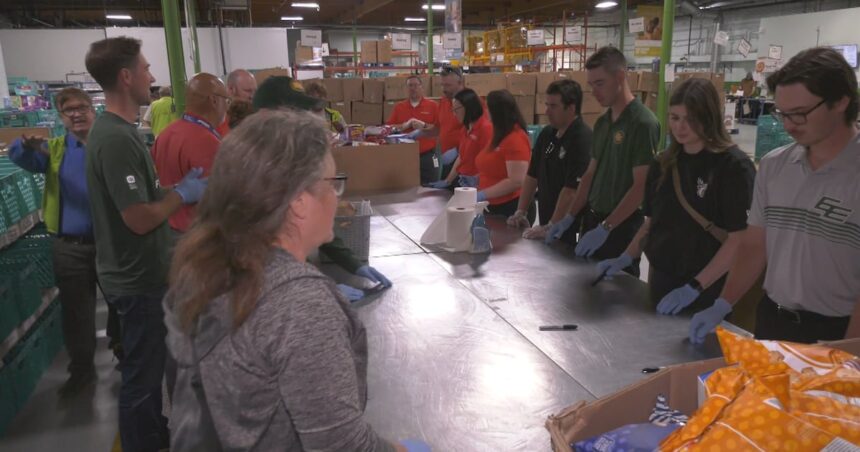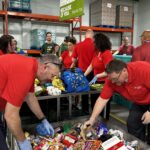I spent Tuesday afternoon watching our Edmonton Elks players trade their football gear for sorting stations at Edmonton’s Food Bank. There’s something particularly moving about seeing these athletes—some standing well over six feet tall—carefully organizing pasta, canned goods, and cereal boxes alongside Food Bank volunteers.
“This is actually my favorite community event of the year,” Elks defensive back Darrius Bratton told me as he filled another hamper. “There’s something immediate about it—knowing these boxes are going directly to families who need them this week.”
The Elks’ volunteer session kicks off the annual Purolator Tackle Hunger food drive, which culminates at this Saturday’s home game against the Saskatchewan Roughriders. Fans attending the game are encouraged to bring non-perishable food items or cash donations.
Edmonton’s Food Bank has been facing unprecedented challenges recently. According to their latest data, they’re serving nearly 30,000 people monthly through their hamper programs—a staggering 55% increase compared to last year at this time.
“We’re seeing many first-time users who never imagined needing our services,” explained Marjorie Bencz, Executive Director of Edmonton’s Food Bank. “The rising cost of housing, groceries, and utilities is pushing more working families into food insecurity.”
As I watched players methodically pack hampers, the reality of our city’s situation became more tangible. These aren’t abstract statistics—each box represents a household in our community struggling to put food on the table.
Elks quarterback Tre Ford, packing his tenth hamper of the afternoon, paused to reflect. “My mom taught me early that community service isn’t optional—it’s just what you do. Edmonton has embraced me as a player, so this is the least I can do to give back.”
The team’s participation extends beyond the players. Coaches, office staff, and even team management joined the assembly line, creating a comprehensive volunteer effort from the organization.
What struck me most was the genuine enthusiasm. These weren’t celebrities grudgingly fulfilling a photo opportunity—they were community members rolling up their sleeves to address a real need in our city.
Last year’s game-day food drive collected over 8,500 pounds of food and more than $26,000 in donations. The team is hoping to exceed those numbers this Saturday.
“Every single can matters,” Elks’ president and CEO Rick Campbell emphasized. “We’re asking fans to bring whatever they can—even one item makes a difference when we all participate.”
For those attending Saturday’s game, donation bins will be located at all entrance gates. Monetary donations will also be accepted, with volunteers explaining that financial contributions allow the Food Bank to leverage their purchasing power to maximize impact.
The timing of this initiative is particularly crucial. Summer months typically see a decrease in donations while family need often increases with children home from school without access to meal programs.
As I was leaving, I noticed linebacker Nick Anderson carefully studying a list of most-needed items for the Food Bank. “I’m going shopping tonight to fill some gaps,” he shared. “They mentioned they’re low on peanut butter and canned protein.”
That moment captured what makes these community connections so valuable. Beyond the official team initiative, individual players were internalizing the need and finding personal ways to contribute.
For Edmonton residents who can’t attend Saturday’s game but want to support the cause, donations can be made directly to Edmonton’s Food Bank through their website or at drop-off locations throughout the city.
The afternoon offered a powerful reminder that tackling hunger requires the same teamwork we see on the football field—everyone doing their part, working together toward a common goal.
As defensive lineman Jake Ceresna told me while hefting a box of donations, “Football games come and go, but this is the stuff that really matters. This is how we show what it means to be part of Edmonton.“







